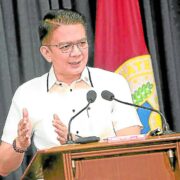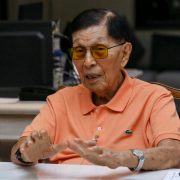The rise and rise of Diego Aspiras
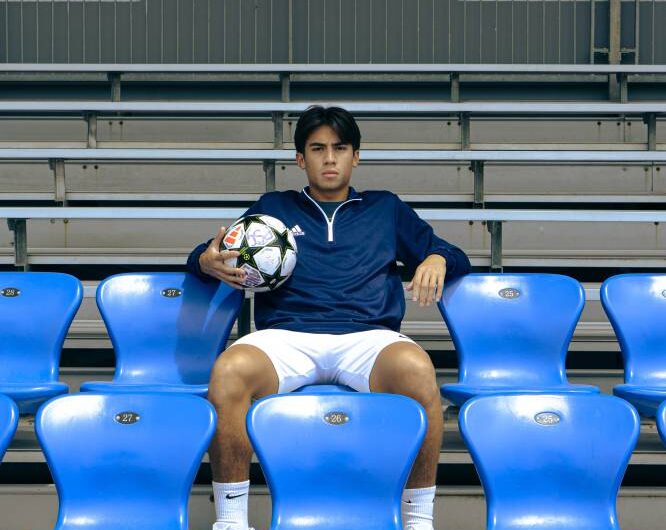
In one word, Diego Aspiras is passionate. In two, no slouch. In three words, down to earth.
These thoughts came to mind after a 30-minute conversation with the 21-year-old hotshot just outside the athletes’ lounge at Vermosa Sports Hub in Imus, Cavite. Low-key to a T, Aspiras is unfazed by the location of today’s shoot.
“I’m used to long drives,” he says. Turns out, he was just at Vermosa a week earlier for a match. He even adds that driving farther down south in Biñan from his home in the north of Metro Manila was a relative occurrence back in his days of playing for local clubs Manila Digger and United City in the Philippines Football League.
Of course, the fact that he played for Barcelona City FC over 11,000 kilometers away from Manila is a dead giveaway. An oversight that should be enough for Aspiras to pull out a metaphorical red card and send me off to the pitch to run around the field under the scorching hot midday sun.
But he didn’t. That just seems to be the kind of person he is. On and off the pitch, Aspiras is cool, calm, and collected. And grounded above anything else. Yet as far as making major decisions about what he wants to do in his life—which apparently he has no trouble making ever since he was a young boy—Aspiras is both thoughtful in his judgment while unafraid to embrace the thrill of an adventure.
“The last game I played in the Philippines was on, I think, the 15th of April this year,” he says about his whirlwind Barcelona City FC 2024 to 2025 journey. “That was the last game of the season here. I was still playing with the national team in the league. Then I literally flew out the next day. I arrived the 16th, then I played the game on the 17th.”
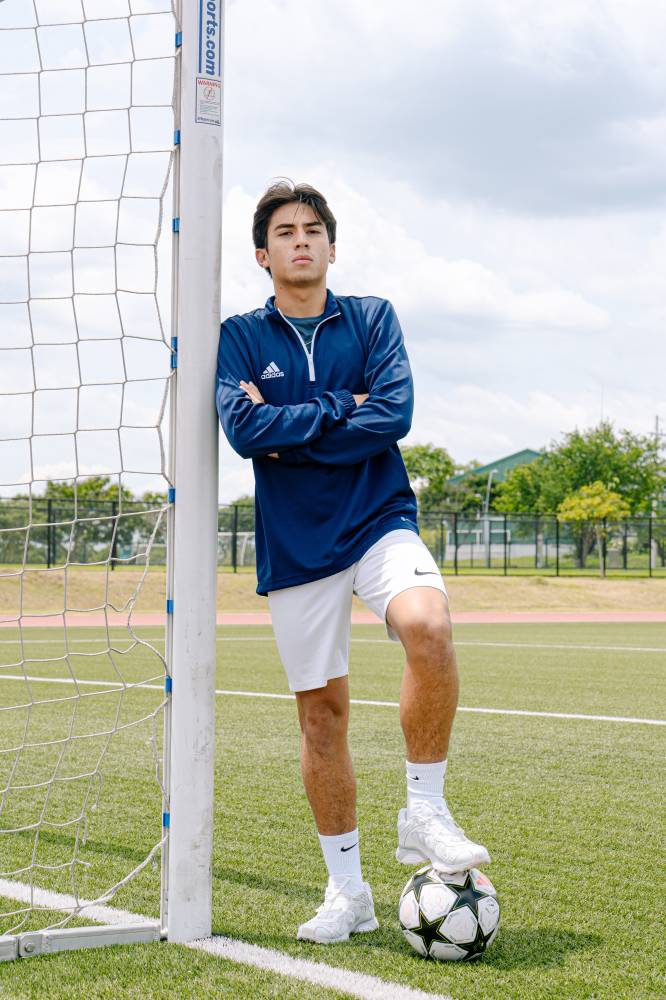
With barely any time to connect with his peers, Aspiras went straight to work—a no-nonsense nonchalance and laser-like focus that reference Lionel Messi and Cristiano Ronaldo as well as Spanish tennis great Rafael Nadal. “I felt like I clicked really well with the team straightaway,” he says about their friendly game against Terrassa.
In some ways, this anecdote carries more meaning beyond just a testament of his adaptability. After all, when the Barcelona City FC head coach and director of methodology himself asks you to come help the team, that must truly hold meaning—especially coming off your rookie pro season.
“[Ramon Tribulietx] is one of the best coaches I’ve ever worked under. He’s a big reason as to why I play the way I play today,” he says about his former United City FC coach.
“He was the first coach that gave me a chance because before he came in, I wasn’t really playing. Then he saw what I could do and ever since, that’s when I started playing the whole game, being part of the first 11,” Aspiras reminisces.
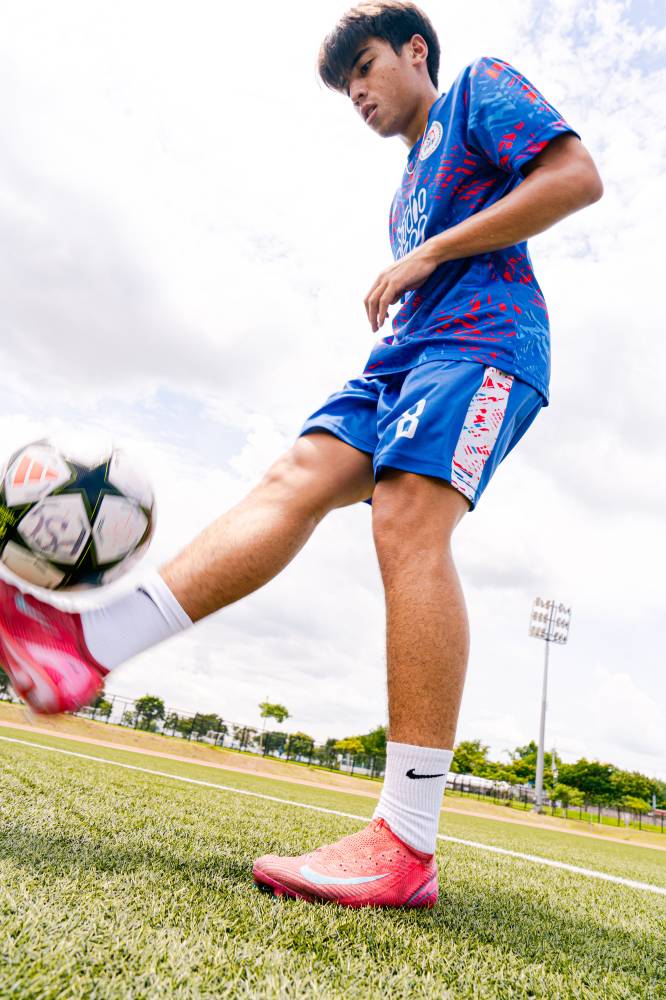
Here comes the son
Aspiras’ football aspirations started at a very early age—about five years old, in fact—when his aunt returned from Spain and brought him back a football. “That’s the first thing I ever remembered about football because that’s how I pretty much started. That’s when I started kicking a ball and that’s when I started falling in love with the sport.”
At about six or seven years old, Aspiras joined Kaya FC to officially kick off his football career. “By the time I was still in grade school, I knew I wanted to just play football for the rest of my life because at one point I was playing basketball also. Then my mom was like, ‘pick one.’ And I said, ‘Okay, I’ll stick to football.’ Then it’s just been with me ever since.”
This decisiveness proved beneficial in his growth as an athlete. It also showed that young Diego had the necessary skills to be a great football player—patience, determination, a strong physical foundation, and a willingness to put in the work.
His ability to swiftly make decisions is just as essential in his current position as defensive midfielder, where setting the tempo and making strategic passes and being aware of pitch positioning are crucial to winning.
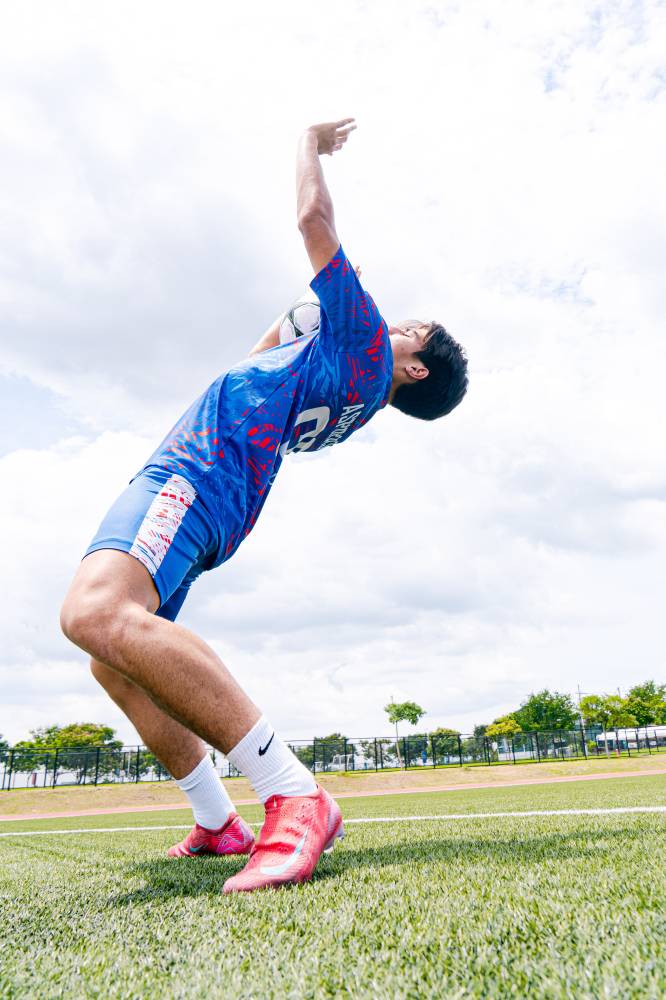
His role obviously demands defense but defense in his case doesn’t equate to passiveness. Rodri, one of the football stars he looks up to, explained it best in an interview: “[I understand that] football is about goals, it’s about the excitement of scoring and I get it, but on the other hand, I can assure you that being a midfielder or defender is as beautiful as being a striker.”
Maybe Rodri is spot on; and maybe football isn’t so complicated when you strip it down to its core. And maybe Aspiras—who also admires Sergio Busquets and Tiago—understands this, too, even more when he spent his time in Barcelona.
“I know what I was walking into, but living there just made me realize how big football is to them. And that kind of like rubbed off me in the sense that I just learned a lot more about the game,” he says about Spain’s football culture.
“Being there and being around people that think the same way as me and have the same ambition just kind of pushed me a bit more—in a good sense.”
Coming to terms with this reality—the gulf of difference between the basketball-loving Philippines and a football nation like Spain—may be what he needs to spur himself on a magic carpet ride to fulfill his goal of playing in La Liga or in the Premier League.
Yet this experience has also helped him loosen up and learn a little more about other important things off the pitch—particularly to just enjoy everything. “That’s the main thing I realized while I was in Barcelona because I was always so obsessed with trying to do good, trying to be perfect and that’s when I never was… that’s when I was farther from it,” he admits.
“I chose football in the first place because I love it. I enjoy doing it. And once I just started letting go and just being happy that I’m allowed to do what I love to do, that’s when I just started playing my best.”
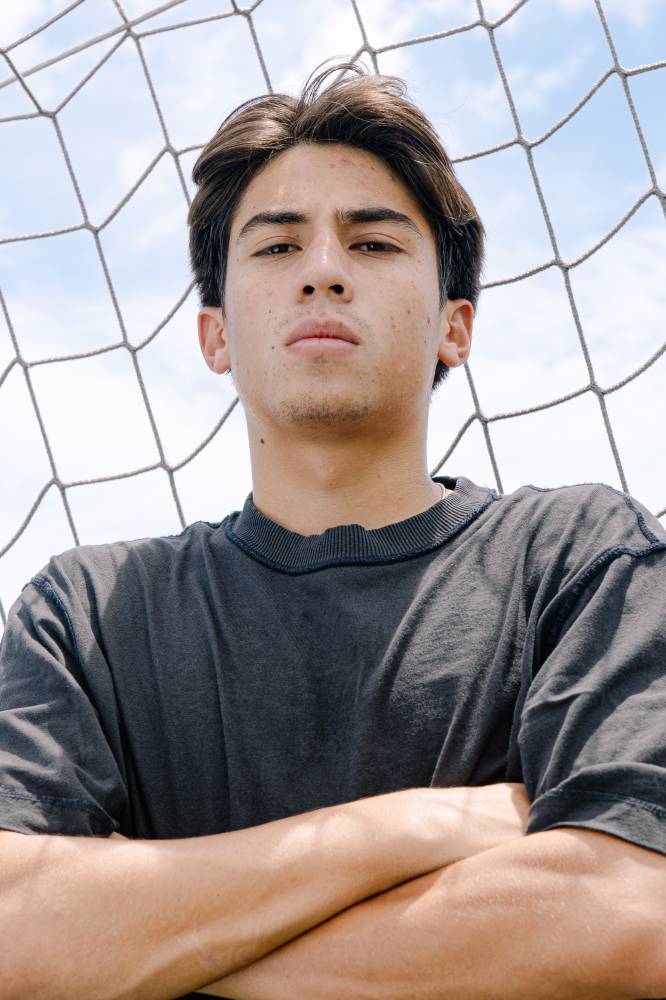
It must have been a little difficult for Aspiras to reconcile with this fact for someone who places football at the center of his life. But the keyword for him lately appears to be “balance.” Yes, he is passionate about the sport—sometimes emotional, too but says he’s handled himself better now—but he’s also made his life a little more straightforward. He’s not caught up too much and football isn’t the only thing on Aspiras’ radar.
He goes out with friends, makes music (“Don’t get your expectations high”), enjoys the sights and scenery of Spain, goes to Costa Brava (“If I have time and I don’t training the next day”), and just lives as a normal 21-year-old guy as possible.
“I didn’t want to go home,” he says about his time in Barcelona. “I called my mom. I was like, ‘Mom, sorry, I don’t want to go home anymore.’”
More than just games
It’s almost noon and the forecasted heavy rainfall never shows up, much to everyone’s relief. The sun is beating down on us, but Aspiras is cool with it all. As he changes into his kit and heads down to the pitch for a little warm-up (and a showcase of his ball-handling mastery), it seems as if he’s the football version of his parents—actor and TV host Edu Manzano and culinary icon Reggie Aspiras.
Strong-limbed with a matinee idol look and currently sporting curtain hair that whips vigorously into the wind, you could easily see him in movies. Except you won’t, as he chooses instead to fit into the mold of great athletes seeking to carve their own space, on their own terms.
For a man who comes across as shy and reserved, Aspiras’ game on the pitch does all the talking—it’s a blend of fitness, speed, versatility, and a lot of heart and soul. He seems to have it all. So whenever expectations about his career and talks of his familial background arise, Aspiras remains unfazed.
“I mean, I understand that, but at the end of the day, I do this for myself,” he says. “I just try to be the best version of me, reach the highest level I can be for myself, not really for no other reason. They’re my parents, but I still want to make that name for myself.”
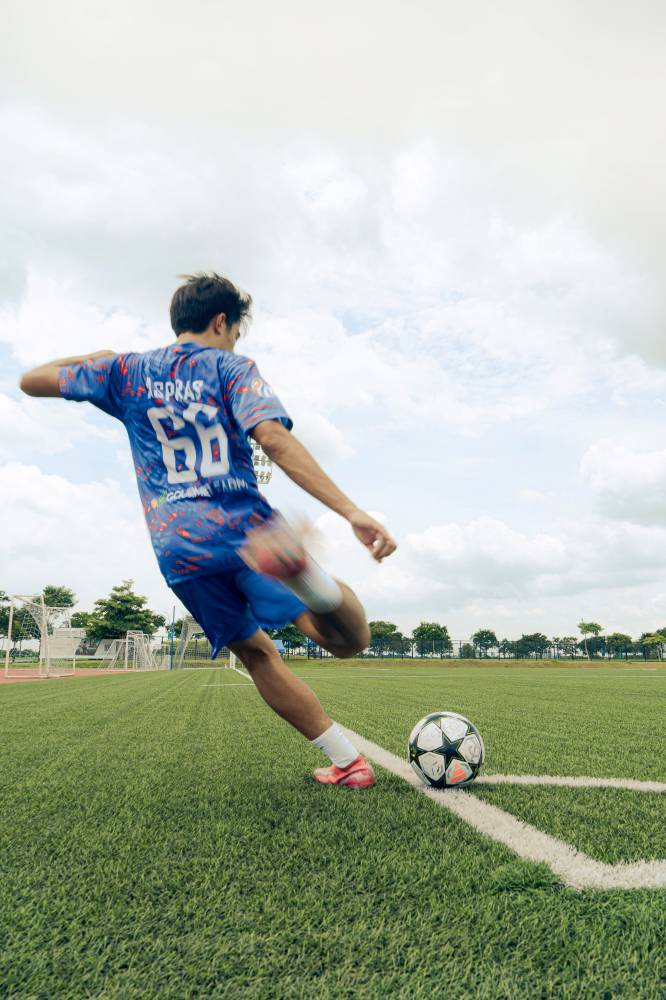
Not that Aspiras feels invincible. On the contrary, he seems to treat the road to his football career as more a marathon than a sprint. One in which he faces hurdles by himself, racing past metaphorical obstacles—such as standing out as a Filipino footballer in Europe and dealing with the challenges of life away from home—but letting his support system drive him forward with every step.
He knows that it should be his own skills and work ethic that should propel himself out of the gates, but it’s his camaraderie with his newfound friends in Spain and support from his family and friends in the Philippines that will help him navigate the ups and downs of a sporting career.
Fortunately, he’s constantly reminded of it on his back and leg—tattooed on his left thigh is his lola’s birthday and another of his uncle’s initials with the number 66, the age when he passed away.
“That’s the reason why I wear number 66,” he explains in his customary matter-of-fact manner. “He was a very stable figure in my life. So when I turned pro, [it was] my first number, and I think it’s been my number ever since.”
As we wind down and get ready to wrap up, I realize that Aspiras is like fire and ice personified. On the surface, he’s cool in his demeanor but inside, passion ferociously rages. I don’t think you can teach a person the belief that Aspiras and a lot of the other U23 footballers raising the flag for the Philippines right now.
“I’d say there’s a lot of potential,” he says about the state of Philippine football today. “The state right now is better than what it used to be, but I can see it growing a lot more.”
And I’m sure Diego can also see himself being one of those figures who’ll help the sport grow even more in the country.
Words by Eric Nicole Salta
Photos by JT Fernandez
Art direction by Nicca Chen
Shot at Vermosa Sports Hub









